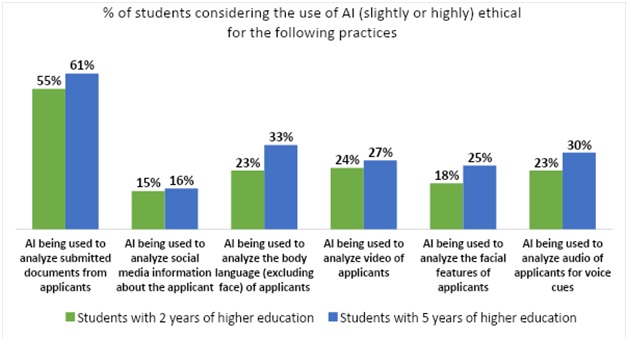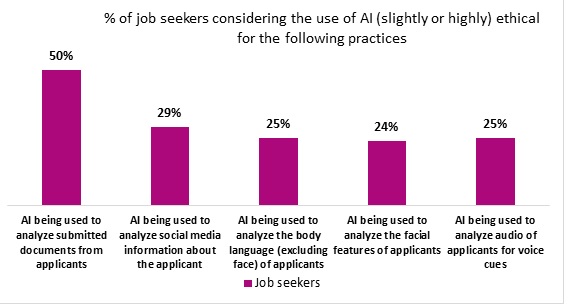By Prof. Serge da Motta Veiga and Genevieve Houriet Segard, EDHEC Business School
While artificial intelligence (AI) is gaining ground in most businesses, considering its impact on society and the ethics of its use is becoming paramount.
AI transforms not only the companies’ products and services but also their relationships with their customers and employees. In talent management, AI is already used in various procedures and in particular during the recruitment phases. For young graduates, recruitment is one of the first points of contact they have with a company. Although they trust AI to create a network of friends or find their soulmate, how do they see things with regard to their search for their first employer?
To answer this question, the EDHEC NewGen Talent Centre surveyed 1,536 management students about their vision of the impact of AI in the business world and more specifically, regarding the use of algorithms in corporate recruitment processes. Their replies and testimonies provide a more nuanced general insight than that which might have been expected from these young “digital natives”.
AI, an innovative technology to be kept under control
First of all, the opinion of the students interviewed at the end of their studies (5 years of higher education) is rather optimistic, with 74% believing that the effects of AI on the world will be positive. They highlight the benefits in terms of productivity and performance: AI is a facilitator of life. Most were of the opinion that: “AI is going to accelerate production processes and facilitate our daily lives.” It will also boost human performance… “provide a means of doing what humans are incapable of, due to their physical or mental limitations”. AI technology drives innovation, with benefits across all fields.
They are cautious, however, and stress the need for a framework for practices. “Only if we manage to correctly control AI can it be a source of progress,” some said. AI must be kept under control and regulated. Those who are less positive fear that AI will contribute to a loss of humanity and the spread of robotisation: “AI is going to replace the least-qualified jobs,” “AI discharges humans too much, to the extent that it makes them less capable and more dependent.”
While they believe AI is driving changes in all areas, about a quarter of young people see the most important impact as being in healthcare, where the technology is enabling more accurate diagnoses, the robotisation of certain surgical procedures and more effective processing of medical data.
Young people often reluctant to use AI in recruitment
AI is becoming more and more prevalent in the organisation of companies and, particularly, transforms the practices of the Human Resources department. In the recruitment process, AI can deliver less-biased assessments of job applicants or shorten the process of recruiting new employees.
Students are reluctant to use AI in recruitment processes; overall, only one in five is for it. Their opinion is nuanced, depending on the type of recruitment practice in which AI is used.
As indicated in the figure below, our results show that using AI to analyse documents submitted by applicants is a lot better accepted than analysis of attitudes, voice, or non-verbal expressions, with the results holding true for students with 2 and 5 years of higher education.

This shows an acceptance of AI when useful for tasks early in the recruitment process, while there is still reluctance when it is used to assess more personal aspects of an interview such as facial expressions. This fully echoes the reservations described previously: young people are less in favour of AI when it interferes with social interaction and threatens to disrupt it.
These perceptions are in line with those of job seekers interviewed in parallel in this study (figure below). The only really distinctive aspect compared to students is a much lower reluctance to use AI when it comes to analyzing the content of social networks.

Many regulators worldwide have made AI regulation a priority and, among others, the European Commission (EC) has recently proposed new rules and an action plan geared towards fostering excellence and confidence in AI. Such initiatives are welcome and the best way to remove the reservations mentioned by Gen Z. They create a legislative framework necessary to avoid the drifts they fear, whether in everyday life, in the recruitment process or in the ‘Man-Machine’ balance.
Views of the authors are personal and do not necessarily represent the website’s views.



 Serge da Motta Veiga is Professor of Human Resource Management at EDHEC Business School. Prior to joining EDHEC, he was a Professor of Management at American University in Washington, DC. He earned his Ph.D. in Human Resource Management and Organizational Behavior from the University of Missouri, and a license in Economics from the Université Libre de Bruxelles in Belgium. His research interests revolve around job search, recruitment, and career and talent management.
Serge da Motta Veiga is Professor of Human Resource Management at EDHEC Business School. Prior to joining EDHEC, he was a Professor of Management at American University in Washington, DC. He earned his Ph.D. in Human Resource Management and Organizational Behavior from the University of Missouri, and a license in Economics from the Université Libre de Bruxelles in Belgium. His research interests revolve around job search, recruitment, and career and talent management. Genevieve Houriet Segard is a senior researcher at the NewGen Talent Centre at EDHEC Business School in Paris, France. She earned her Ph.D. in Population Economics from the Paris Institute of Political Studies (Sciences Po), France. She has been working for several years on socio-economic and employment issues with a generational dimension. Her work focuses on next generations’ employment behaviours and competencies, and organizational practices that favour inclusion and diversity.
Genevieve Houriet Segard is a senior researcher at the NewGen Talent Centre at EDHEC Business School in Paris, France. She earned her Ph.D. in Population Economics from the Paris Institute of Political Studies (Sciences Po), France. She has been working for several years on socio-economic and employment issues with a generational dimension. Her work focuses on next generations’ employment behaviours and competencies, and organizational practices that favour inclusion and diversity.